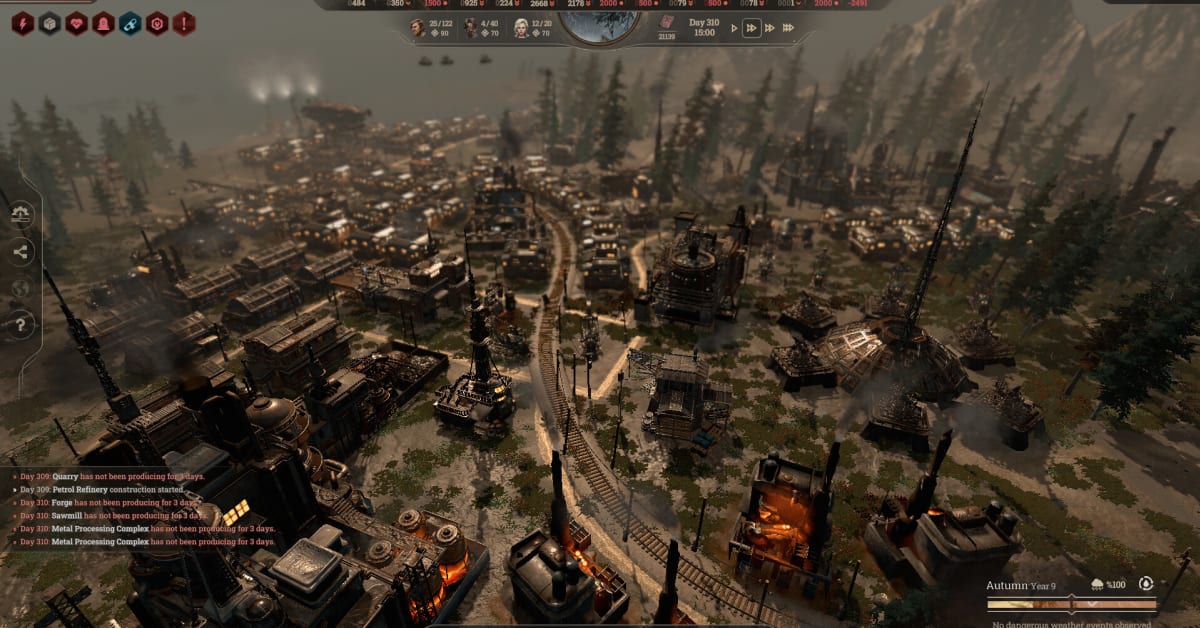
New Cycle is a dieselpunk city-builder that already shines in Early Access
What happens when dieselpunk aesthetics, rock-solid city-building mechanics, and Factorio-like logistics love each other very much? It’s quite easy: New Cycle is born.
Developed by Core Engage and published by Daedalic Entertainment, New Cycle launches into Early Access on PC via Steam on January 18, 2024, and at times it’s difficult to believe that this isn’t a fully finished game quite yet. I had the chance to dive into the title for a few days ahead of the Early Access start and came away with a very strong first impression.
At its core, New Cycle is an archetypical city-builder that’s all about creating production chains that become ever more complex as time goes on, all in the name of fulfilling the people’s demands – there is this survival aspect to it that drives your decisions. Your people can starve and die, but before that they’ll make sure to make your life hell by causing unrest. It’s not just about making your settlement more prosperous like in Anno or Pioneers of Pagonia.

You can build large towns with hundreds of inhabitants in New Cycle.
Core Engage / Daedalic Entertainment
Your population is at the center of everything you do in New Cycle – managing it is one of the big challenges of the game. Giving your people additional rations will make them happier and ensure good health, but may strain your production capabilities. Some people may also get lazier if there is an overabundance of rations. You need to balance the morale and workforce of the people in a careful manner, if you are to survive and build a new future for humankind in this strange, hostile world that saw civilization wiped out by a solar flare.
Logistics, at least at the start, revolve around people as well. While roads make your settlement more efficient by providing production bonuses, resources don’t require physical transportation anywhere outside of construction. You can build a camp collecting mushrooms on one side of the map and the resources it harvests will be available in the kitchen on the opposite side of town immediately. However, each building requires workers to function, making population numbers the limiting factor for logistics. This makes you constantly re-evaluate your structures and how many workers you need at which one at that moment. You can later educate your workers to upgrade them, as more knowledge is required to operate higher tier buildings, so estimating those needs correctly is another important matter.
New Cycle offers both free-form construction and a grid-based mode, which is super neat for planning your towns – and you still need to do that, despite roads being less of a critical factor early on. Resource buildings need to be placed where the resources are and may have to move once these spots are depleted. Wind power can only be generated efficiently at certain spots. Later in the game you will need to consider physical resource transport, though, and it pays dividends to plan your city’s layout with foresight: Complex systems of conveyor belts can connect your factories and resource buildings with each other, speeding up your economy, so New Cycle even scratches that Factorio itch a little bit.

New Cycle has a large list of resources and goods to fuel its economy.
Core Engage / Daedalic Entertainment
There is a strong environmental component to the game as well. Certain resources can only be gathered in specific seasons and goods like mushrooms, water, and game to hunt may run out during the year, only to be replenished at the start of the next one. This is particularly cool, because the amount of replenishment that takes place is dependent on the amount of rain that fell during the previous year – so if there isn’t a lot of rain, you can plan for a drought to come. Lightning strikes, sandstorms, and other natural disasters pose a threat to even the most prosperous towns, so you’re never quite safe and will need to deal with such events.
As you gather knowledge and your population grows, you enter different ages and unlock more of the tech tree. This is pretty much the only system that didn’t really vibe with me during play, as it made the pacing feel off – especially at the start. The only ways of gaining population are to have people make kids and wait for them to grow up or accept wandering refugees. At the beginning, the latter is your main way of growing, but these refugee events don’t happen very often, so after you’ve set up your initial infrastructure and ensured that your people survive the first winter, you have essentially nothing to do, because your population grows so slowly, keeping you from unlocking any new tech and buildings. You just watch as your stockpiles fill up. While that gives you some strategic reserves, it’s not exactly engaging.
This issue gets smaller the deeper into the game you go, since each age brings more and more buildings, resources, and possibilities, and your population grows quicker the more of a base you have, but it makes the starting experience feel less than great – and it’d be a huge shame if that would turn people off from playing.

Re-discovering the technology behind trains is a key step towards securing your late game economy.
Core Engage / Daedalic Entertainment
There is also a mission system, you can make laws with certain benefits and disadvantages, and you can even interact with the outside world, exploring the surrounding area with your scouts. They can work on events encountered in different regions and set up operations to extract more basic resources from there, since those will eventually run out at your starting location. Late in the game you can even construct an entire railway system to transport those resources from your outposts into your metropolis more efficiently.
In Early Access you can expect the developers to add additional biome types (there are three at the moment) with different modifiers, a series of challenges to complete, and other content alongside technical improvements (though there are no complaints on this front from my side) and balancing (which I hope includes an adjustment to the pacing early on).
New Cycle already is incredibly feature-rich and has so much meat on it that it feels like it’ll be worth genre fans’ time even ahead of its full release – it really leaves a strong first impression.
It’s worth noting, though, that the studio has used AI-driven NPCs in past test versions of the game, which were supposed to make the dialog between you and any NPCs feel more natural by making those characters react to your town’s current situation. Since this is a controversial topic among gamers at the moment, Core Engage has decided not to include this feature in the Early Access phase, at least from what I understand from the studio’s recent blog post about it. It intends to evaluate the situation further before making a final decision on a future inclusion of AI – so if this is a subject you care about, it’d be best to wait and see and provide the developers with feedback in this regard.


